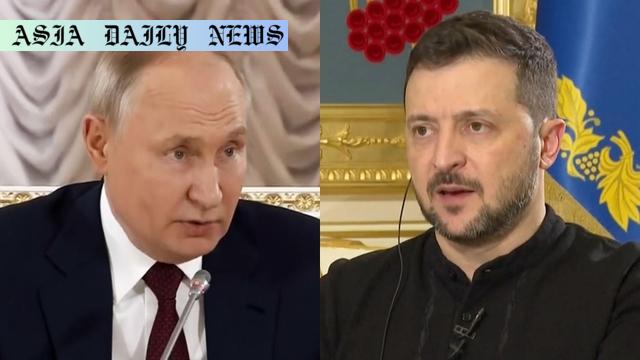Putin suggests Ukraine establish a temporary administration for presidential elections under UN supervision.
- Putin calls for a temporary administration in Ukraine for presidential elections.
- He questions Zelenskyy’s legitimacy, claiming his term has expired.
- Proposes UN oversight and potential discussions with the USA for new leadership in Ukraine.

Introduction to Putin’s Proposal
In a recent speech made in Murmansk, northern Russia, Russian President Vladimir Putin emphasized his stance regarding the legitimacy of Ukraine’s leadership. Addressing a group of submarine crewmembers, Putin highlighted what he perceives as a constitutional void within Ukraine’s political landscape. He claimed that Volodymyr Zelenskyy, Ukraine’s President, is no longer legitimate since his term expired in May of the previous year. This controversial statement was accompanied by a proposal for the establishment of a temporary administration to oversee Ukraine’s upcoming presidential election, an effort he suggested should be facilitated under the auspices of the United Nations.
Putin’s Rationale Behind the Proposal
Putin’s remarks stem from the fact that Ukraine postponed its presidential election, initially slated for March 2024, due to the imposition of martial law following Russia’s invasion. In light of these circumstances, Zelenskyy has been granted extended powers to lead during the tumultuous wartime. Putin, however, views this extension as illegitimate, questioning the legality of Zelenskyy continuing to govern. This skepticism not only undermines Zelenskyy’s position but also brings into question whom to negotiate with on Ukraine’s behalf for peace talks or other critical discussions.
The Russian leader further clarified that he would prefer to engage with a new Ukrainian leadership formed through an internationally supervised election. Highlighting his increasing desire to involve external players such as the United States and the United Nations, Putin suggests that global collaboration is required to ensure transparency and legitimacy in establishing Ukraine’s future leadership.
Implications for Ukraine
Given the ongoing Russia-Ukraine conflict and heightened geopolitical tensions, Putin’s call for an externally supervised election has broad implications for Ukraine. Certain factions within Ukraine and the international community may view this suggestion as an intrusion into Ukraine’s sovereign decision-making processes. The Ukrainian government, resisting Russian aggression since 2022, has consistently maintained its autonomy in deciding its internal political structure.
From another perspective, UN involvement may provide Ukraine with an opportunity to bridge international support and display a commitment to democratic norms. However, for Ukraine, balancing domestic wartime stability while adhering to external pressures for elections amid stringent martial law remains a significant challenge.
International Reactions to Putin’s Stance
Putin’s proposal has ignited a wave of speculation among international observers, who dissect his motives behind questioning Zelenskyy’s legitimacy. Critics argue that this could be a strategic move designed to delegitimize the current Ukrainian government and bolster Russia’s geopolitical leverage. Others, however, propose that his emphasis on peace talks with a new Ukrainian leadership displays a potential pivot toward de-escalation, should circumstances align in favor of his narrative.
The suggestion of engaging the United States—allegedly through former President Donald Trump—further strengthens the argument that Putin seeks significant global players’ involvement to support his agenda. Whether these statements aim to genuinely foster peace or subtly pressure Ukraine remains ambiguous; however, it is evident that his remarks have once again rekindled global focus on the Ukrainian crisis.
Potential Outcomes Moving Forward
If Ukraine were to consider holding elections under UN supervision, various changes in its domestic and international approach would need to occur. Transparent governance and a clear roadmap for war-period elections would need to be delineated. Conversely, dismissing Putin’s suggestion may catalyze further discord, with Russia accusing Ukraine of circumventing democratic practices.
Observing how nations advocating for Ukrainian sovereignty, including European allies and US leadership, respond to this proposition will shape the future course of action. Whether these countries will categorize Putin’s rhetoric as a genuine peace offering or a mere strategic maneuver aimed at undermining Ukraine’s integrity remains to be seen.



Commentary
Understanding the Context
The ongoing conflict between Russia and Ukraine has been fraught with accusations, geopolitical strategies, and shifting narratives for over a year. President Vladimir Putin’s recent suggestion to form a temporary Ukrainian administration to oversee presidential elections is yet another development in the highly volatile conflict. While it superficially appears to advocate for a democratic process in a war-torn country, the implications of this proposal cannot be ignored.
The Legitimacy Debate
Putin’s statement asserting that Volodymyr Zelenskyy’s presidency is “illegitimate” is a bold claim aimed at shaking the confidence of Ukraine’s allies and citizens. Zelenskyy has become a symbol of resistance against Russian aggression, and any attempt to undermine him can be viewed as a targeted political strategy. However, it is worth questioning whether Putin’s concern genuinely stems from upholding democratic norms or if it is an effort to weaken Ukrainian morale.
The Role of International Players
The idea of involving the United Nations or the United States in facilitating Ukraine’s elections adds a complex layer to this issue. While international oversight may ensure transparent elections, this raises concerns about Ukraine’s autonomy. It also opens discussions about whether such external involvement would set a precedent for future interventions in sovereign nations during crises.
Looking Ahead
In a time when global tensions are soaring, this issue requires nuanced handling from Ukraine and the international community. A balance must be struck between addressing internal democratic integrity and resisting undue external pressures. In the end, the pursuit of peace in the region should remain the highest priority for all stakeholders involved.